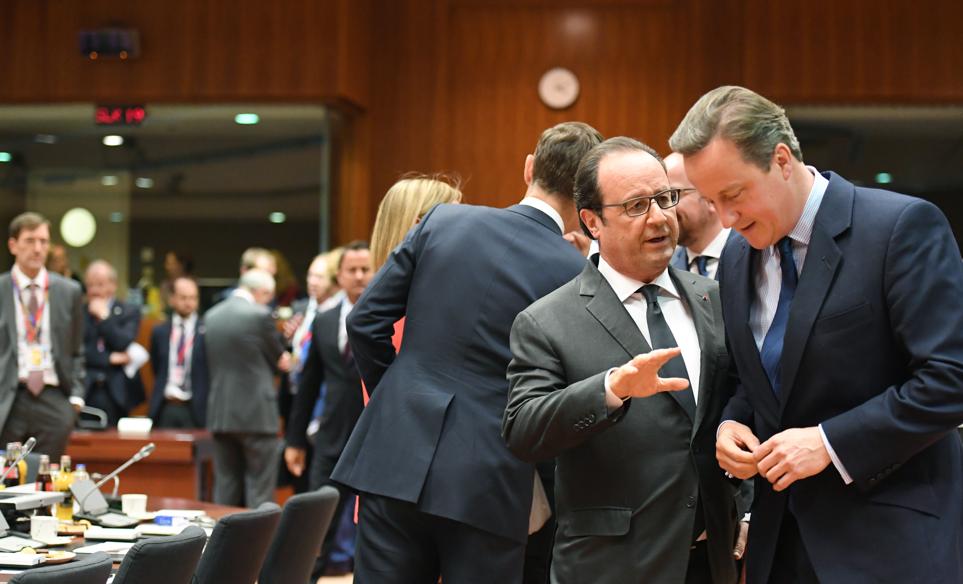
BRUSSELS — Stunned and divided by Britain’s vote to leave the European Union, leaders of the bloc’s member states converged in Brussels on Tuesday to prepare for a painful divorce, although Britain’s own political crisis made any rapid separation unlikely.
European leaders were struggling to strike a delicate balance: leaving the door open just enough for a possible compromise with Britain, while making it clear that they would not make any further concessions to get Britain to change its mind.
Chancellor Angela Merkel of Germany said she would use “all her strength’’ to prevent the European Union from drifting apart, but she emphasized that nothing legally could be done to address Britain’s relations with the bloc until it triggered the legal mechanism for leaving — something that Prime Minister David Cameron of Britain has refused to do, insisting that whoever succeeds him should make that decision.
Before leaving for Brussels, Merkel told her Parliament that Britain would want to maintain “close relations’’ with the European Union but also signaled that it could not expect business as usual.
“Whoever wants to leave this family cannot expect to have no more obligations but to keep the privileges,’’ she said. “There must be and will be a noticeable difference between whether a country wants to be a member of the European Union family or not.’’
Merkel quashed any idea of exploring alternative arrangements before then until Britain starts formal procedures to leave, a point she made on Monday after meeting with the leaders of France and Italy. “The talks can begin only then, and not before — either formally or informally,’’ she said.
She made it clear that Britain could not expect full access to the EU’s common market without accepting its conditions, including the free movement of people. Immigration was the crux of the often ugly debate that accompanied the so-called Brexit campaign, Merkel said.
President François Hollande of France was among a group of European leaders who pushed Britain to act quickly and resolve the uncertainty that has consumed the Continent.
“We need to begin the United Kingdom’s exit process from the European Union as quickly as possible, and then start the negotiations that will follow,’’ Hollande said. “I can’t imagine that a British government, whichever one it may be, would not respect the choice of its own people.’’
Hollande said that Britain had decided to leave and that it was important for the EU to move on. “The British have made a choice,’’ he told reporters. “By a large majority they decided to leave the European Union. We must draw all the conclusions, even though I regret this choice — but I want to respect it.’’
He added: “We must also as Europeans draw a certain number of conclusions. A new impulse is necessary: protect our borders, invest more, turn toward youth and organize the eurozone in a more democratic way, so that it may also harmonize fiscal and social policies.’’
Other leaders shared Hollande’s impatience. The prime minister of Luxembourg, Xavier Bettel, said Britain and Europe could be “married, or divorced, but not something between.’’
But Joseph Muscat, the prime minister of Malta, said the bloc should not obsess over the minutiae of Britain’s departure but instead focus on the bloc’s future.
“I think it’s utterly disappointing that, when we are faced with the biggest political crisis in the history of the European Union, what’s grabbing the headlines is the obscure Article 50,’’ he told reporters, referring to the treaty provision that details how a country can leave the bloc.
The major issue is “that this is a Europe that people are feeling increasingly estranged from and that it is in our duty that we take action,’’ he said.
Cameron, who plans to resign by October, arrived for what was almost certainly his final meeting at the European Council, telling reporters: “I’ll be explaining that Britain will be leaving the European Union, but I want that process to be as constructive as possible.’’
Cameron was scheduled to dine with his counterparts to discuss the aftershocks of the referendum but will then return to London — leaving the other leaders to spend Wednesday reflecting on the bloc’s future.
The European Parliament adopted a nonbinding resolution that asks Britain to set the clock ticking “as soon as possible’’ on the Article 50 process, which could lead to a withdrawal from the EU in two years.
An earlier draft of the resolution had called on Britain to invoke the legal process “immediately.’’
Before the vote, anti-European lawmakers gloated over the British referendum.
“Isn’t it funny,’’ said Nigel Farage, the leader of the anti-European UK Independence Party and a longtime member of the European Parliament,. “When I came here 17 years ago and said I wanted to lead a campaign to get Britain to leave the European Union, you all laughed at me. Well, you’re not laughing now.’’



